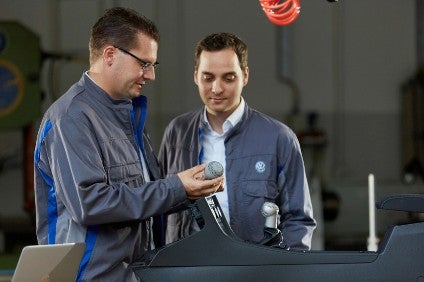
Volkswagen claimed to be the first automotive manufacturer using HP’s Metal Jet 3D printing technology which simplifies and speeds up metallic printing.
The automaker said productivity improves by 50 compared to other 3D printing methods, depending on the component and added “three-dimensional printing is mass production ready”.

Discover B2B Marketing That Performs
Combine business intelligence and editorial excellence to reach engaged professionals across 36 leading media platforms.
The company is working with printer manufacturer HP and component manufacturer GKN Powder Metallurgy to start mass production after showing the new process at the International Manufacturing Technology Show (IMTS) in Chicago.
Martin Goede, VW’s head of technology planning and development, said: “Automotive production is facing major challenges: our customers are increasingly expecting more personalisation options. At the same time, complexity is increasing with the number of new models. That’s why we are relying on technology to ensure a smooth and fast production. 3D printing plays a particularly important role in manufacturing of individual parts.”
Previous 3D printing processes can only be used for special production of individual parts or prototypes. The metal jet allows production of a large number of parts without having to develop and manufacture tooling, reducing production time and faster output of large numbers.
VW and partners are developing the technology so design elements can be printed in a small series at first – parts such as tailgate lettering, special gear knobs or keys with personalised lettering. This will be offered to customers as soon as possible.
GKN Powder Metallurgy intends to establish “a process chain geared toward automotive production” with Volkswagen. The first small (design) components will further develop the technology so that the first structural components for mass production vehicles can be printed within two to three years.
“A complete vehicle will probably not be manufactured by a 3D printer any time soon but the number and size of parts from the 3D printer will increase significantly,” said Goede.
“Our goal is to integrate printed structural parts into the next generation of vehicles as quickly as possible. In the long term, we expect a continuous increase in unit numbers, part sizes and technical requirements right up to soccer [ball]-size parts of over 100,000 units per year.”
The new additive process produces layer by layer using a powder and binder. The component is then ‘baked’ into a metallic component in a sintering process. This differs from previous processes in which powder is melted by a laser.
Stephen Nigro, President of 3D Printing at HP Inc, said: “Volkswagen is driving unprecedented innovation as the automotive industry goes through its most transformational era since cars first rolled off the assembly line. We’re proud to collaborate with Volkswagen to identify opportunities for production based on HP’s new Metal Jet 3D printing platform. Together we are engineering and testing solutions for mass-customisation and the creation of higher-performance, lower-cost functional parts. And as electrification ushers in entirely new vehicle architectures, we’re excited to collaborate on future 3D applications such as the lightweighting of fully functional and safety certified metal parts.”
BMW’s Mini is among a number of automakers using earlier 3D printing technology to make accessories.






